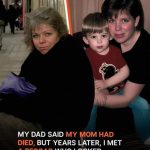For her granddaughter’s future, Elaine has given up everything—every penny, every painful double shift, every dream postponed. However, Elaine is forced to face loss, treachery, and the strength of harsh love as Miranda makes a terrible decision. The lesson that emerges is one of atonement, family, and unwavering love.
I’ve experienced the Vietnam War, the civil rights movement, 9/11, presidential assassinations, and now TikTok, but I still don’t understand why anyone would want to record themselves dancing in public.
Perhaps we simply noticed it more, but the world seemed to move more slowly back when milk came in glass bottles and Elvis was only a truck driver with a dream.
I grew up with three kids in a home with thicker love and thinner walls. I buried my beloved hubby. Mel’s Diner was where I worked double shifts until my fingers curled with age and my feet gave out.
I move more slowly now. My knees hurt in bad weather, and my hands no longer braid hair the way they used to.
However, I was pleased with the life I had created. It wasn’t flawless. It wasn’t simple. However, every wrinkle, scar, and sleepless night was for the people I cared about. Additionally, treachery pierces right through your bones after you’ve sacrificed so much.
Miranda’s actions almost split me in two because of this.
Before her soul was poisoned by fame and greed, she was my favorite person.I didn’t have much after my spouse, Paul, died. To be honest, I got by on a meager pension from the cafe, my monthly Social Security, plus any tips I hid in a Mason jar under the sink or stuffed in envelopes.
Nevertheless, I vowed to conserve whatever I had left for Miranda’s future. It was all for her, not for me.
I was sixty-one when my granddaughter was born. By that time, her father, James, my middle boy, was already deeply addicted. When Miranda was six years old, her mother Helen disappeared, and she never phoned again—not even on her birthday.
Without requesting it, I found myself in the role of mother once more, complete with creaking knees and hands that were no longer able to hold a brush.
However, I made an effort. I tried, my god.
I drew hearts on her napkins and packed her school lunches. If she asked me to, I would read the same story three times while perched on the edge of her bed. Despite the pain in my fingertips, I braided her hair.
I would occasionally watch her sleep in the middle of the night and mutter a prayer. The type of prayer you send into the dark with the hope that love alone will carry it to heaven, even though you don’t know if it will ever make it there.
“Please, God. I never gave her more than she had. She is deserving of everything.
I began to save as much as I could. Coupon cutting was like a second job to me. For twelve years, I sold brownies and lemon pies at every church bake sale. Unless my old shoes were breaking apart, I didn’t buy new ones.
When the shingles trembled in the wind, I chose not to fix them. The cold cut through my coat, but I still walked to the grocery shop.
It was all for Miranda, too.
I managed to cobble together slightly over $42,000 throughout the years. It opened a door for my granddaughter, but it wasn’t enough to buy her the world.
I once practiced exactly what I would say while doing the wash.
“Miranda,” I said, half-laughing. “This is to help you learn. It’s for your liberty. Additionally, this is for the life you were destined to lead.
With all my heart, I thought that to be the dream.
However, when Miranda turned sixteen, something changed. Like watching warm milk go bad in the refrigerator, it happened gradually rather than all at once. At night, the girl who used to nestle up next to me with a library book and inquire about stars began to sneak out.
Perfume that certainly didn’t belong on a stranger would hang in the air, voices would drift through the window, and I would hear her laughing on the front lawn.
She put in extensions, bleached her hair blond, and even painted her nails in impossible-to-achieve hues when she was eighteen. Her phone hummed like a heartbeat, and her schoolbooks remained undisturbed.
She was wearing one of my old church dresses, cut short with scissors, and dancing in the kitchen one evening when I discovered her filming herself.
“Miranda,” I said softly at first. “Hey sweetie, how are your grades? Your most recent report card—”
“Grandma, you don’t get it,” she remarked, dismissively waving me away while rolling her eyes. “Books are no longer important to anyone. It all comes down to your vibe, or how you present yourself.
“Sweetheart,” I replied, attempting to maintain my composure and smile. “I believe that your identity is more important than your appearance. We must resolve the school matter, Mira. Come on.”
She grumbled, “Ugh, that’s so outdated,” and hurried to her bed.
It was a phase, I told myself. After all, don’t all teenagers rebel? However, something colder was taking root in front of me, and the kind, considerate child I’d reared was vanishing.
She soon began missing class and receiving warnings for vaping in front of the school’s bleachers. I occasionally caught her lying about her whereabouts. And to be honest, she talked to me less often than she scrolled through social media.
Then one evening I heard my granddaughter talking on the phone as I passed her bedroom.
Whispering, “If I had my own ride,” she said. “I would at last be taken seriously by everyone. I would also be untouchable.
My chest constricted. She had no desire for school. Status was all Miranda desired.
The incident took place on a chilly November afternoon. With my knees hurting from the walk and the wind tearing through my coat, I had just returned from the pharmacy when I realized the closet door was open. It would have been odd just for that. However, there was nothing behind my winter clothes when I opened it.
The lockbox has vanished.
I initially stood there blinking, thinking that perhaps I had moved it. Perhaps I had forgotten—I was getting older. Even though I knew better, I looked in the linen drawer, the closets in the corridor, and my bedroom.
I was as familiar with that box as I was with the lines in Paul’s handwriting. It was safe and constantly present.
As I reached for the phone, my hands shook, my throat became dry, and my stomach flipped.
I gave my granddaughter a call.
With music playing in the background and laughing leaking into the line, she picked up immediately.
“Miranda, where’s my lockbox?” Not even trying to hide my terror, I asked.
She laughed nervously and said, “Grandma, relax.” “I took it from someone. Just a loan, will we?
“A loan?” Stunned, I repeated. “That money was for your future, Miranda! For school! For life!”
“Oh, hurry up. College? Gran, do you truly think I’d make a good college student? She changed the tone of her voice from lighthearted to acerbic, saying, “And it’s not like anyone cares about that anymore.” “I used it more effectively. You simply wait! You’re going to be blown away!”
I was drinking a cup of tea two hours later when I heard it—the squeal of tires and the sound of an engine. A noisy, trophy-like cherry-red Honda pulled into the driveway. I later found out that she had purchased it via Facebook Marketplace, where no inquiries or documents were required.
Even though it was twilight, Miranda went out with her big sunglasses on. She was wearing a brand-new tracksuit and had a heartbreaking smirk on her face.
She opened her arms wide and twisted her keys in her hand. For a brief moment, I saw a child attempting to construct a crown out of smoke rather than a teenager driving a car.
“Look at this? Gran, I’m no longer a loser. Now I’m someone.”
I didn’t respond. I was unable to. My legs were like lead. Stunned, I stood on the porch, both hands gripping my cardigan tightly.
She said, “You should be thanking me,” as she brushed by me. “You no longer need to be concerned about my future. I’ve got things under control.”
I laid in bed that night holding Paul’s old pillow, whose fabric was frayed from years of use. It felt like my chest was giving out. I sobbed until my ribs hurt from the effort then the cries ended and there was silence.
Less than a month was the car’s lifespan.
Day 20: Miranda swerved to avoid a cyclist, ran a red light, and tangled the vehicle around a utility pole.
There was no automobile, no insurance, and no reimbursement. We both knew she was lucky, but they only gave her a citation because one person was injured.
I got a call from the hospital. She was sitting on the edge of the bed with mascara running down both of her cheeks and her arm in a sling when I arrived.
“Grandma,” she said in a low voice. “I lost everything.”
Slowly and steadily, I took a seat next to her and met her gaze.
“No, Miranda,” I muttered. “I lost everything. You don’t even give a damn. You’re not even aware of that.
She made another attempt the following morning. Silently, with her arms folded and her eyes red, Miranda appeared at the kitchen table.
Quietly, “Grandma,” she said. “I need cash. Only a bit. to regain my footing.”
I made her a cup of tea, the kind she used to enjoy, with a little milk and two sugars. I gently placed it in front of her.
I responded, “You stole my future, Miranda,” without faltering. “Lord, girl. To be honest, you robbed your own future. You must now adapt to the future you created.
Her jaw fell open as she yelled, “You’re supposed to help me!” “You brought me up! You claimed to love me. Treating those you love in this manner is unacceptable.
I said, “I do, my girl,” as we met eyes. However, love does not entail shielding someone from the repercussions of their own decisions. It entails understanding when to take a step back and allow the lesson to fully sink in.
She shoved the tea aside and hurried out, slamming the door so forcefully that the cabinets shook. She pouted for weeks after that. I couldn’t get my granddaughter to talk to me.
She even moved out, and from what I’ve heard, she was sleeping on couches belonging to friends, arriving late for her part-time job at the smoothie bar, and using up whatever remaining goodwill she had.
On Instagram, she shared cryptic stories with terrible captions.
“Family isn’t always blood.”
“Some people just want to see you fail.”
And even though I saw such crap on social media, I didn’t follow her or leave a comment. I simply waited.
I remained steady even though it crushed my heart. It was a requirement of love. Refusing to soften the fall is sometimes the hardest act of charity.
I didn’t anticipate hearing from her when graduation season arrived. After everything, I wasn’t even certain she would complete high school. However, I sat by myself in the back of the auditorium that June night and saw her traverse the stage wearing a wrinkled gown and borrowed shoes.
She knocked on my door that evening.
She was still wearing her gown and cap, her cheeks were swollen, and her mascara was smudged.
She said, “I found this,” and held out a folded piece of paper. “Gran…”
I had placed a message in the lockbox. I never imagined Miranda would read that one.
“Mira, this money isn’t for clothing or vehicles. For the lady you were destined to be. You’re taking from yourself if you discard it, not from me in terms of a future.
I remained silent.
“Now I understand. Being someone meant a lot of things to me. However, it’s about your identity. Gran, I’m not her yet.
She sobbed as she collapsed into my arms. I also gave her permission. I didn’t have to say much, so I kept quiet. Silently, like the first light of morning easing a long night, forgiveness creeps in.
However, Miranda is the only one who is unaware of this section.
The forty-two thousand? I saved more than that. Even her actual college fund wasn’t that.
My husband’s side of the family left me a modest legacy after his death. Almost $120,000.
Of course, I never touched it. Additionally, I put money in an other account in Miranda’s name, to which she won’t have access until the appropriate moment. She was unaware of its existence.
I had set up the $42,000 test during my granddaughter’s disobedient years.
She stole the lockbox, so I chose to wait to notify her, even though I had planned to do so when she turned 21. I wanted to know what type of woman she had become—not the girl who was after status and likes, but the one who was prepared to learn from her worst error.
It’s been a year now.
Of all things, Miranda decided to pursue a nursing degree at a small college. I initially assumed she choose it because her friends were discussing stable careers, but then I saw her face when she returned home one evening while still wearing scrubs and described a patient she had assisted in walking down the hallway following surgery.
She told me, “He said thank you three times,” with eyes that gleamed as they hadn’t since she was a child. “I held his hand when he was afraid, not because I accomplished anything significant. It only required that.
I was plating the cottage pie I had prepared for supper. As I listened, my heart began to race. I had hoped for a girl like this, someone who knew that a little act of kindness might make someone’s entire day.
She still keeps her tips in a jar despite working weekends at the grocery store. The inheritance is waiting for her, even though she isn’t aware of it yet.
Miranda and I visit the farmers market together on Saturdays. She is determined to carry the luggage. She smiled at me over her shoulder as she selected a bunch of fresh peppers this morning.
“You know what we haven’t had in forever, Gran?” she said, giving me a little prod. “Your chili. The good one. The kind that makes you desire more by slightly burning your lips.
“That recipe has ruined relationships, you know?” I shook my head and laughed.
“I’ve got nothing to ruin, Gran,” she murmured, putting her arm around mine. “I just have to be better.”
We talked about her part-time job at the grocery store and the weather as we strolled around the stalls. She informed me about the client who claimed that she was kind and that it brightened her entire day.
She said, “You know, Grandma,” but now she was quieter. “Previously, I didn’t understand. The things you did for me years ago. Love, everything of it. I assumed I automatically deserved it. I had no idea how much it cost you.
“You were worth it,” I cheerfully remarked.
Her words, “I want to be worth it,” “I want to earn it now.”
Yes, she still slips occasionally. However, she is no longer the girl in the red Honda. She is changing into someone else. Someone far superior. I may be able to tell her about the true inheritance shortly. But now that I know, she’s turned into the type of woman who refuses to let it break her.
Additionally, it will serve as a reminder rather than a reward: the money I gave her wasn’t the most important lesson. I didn’t have the money.


